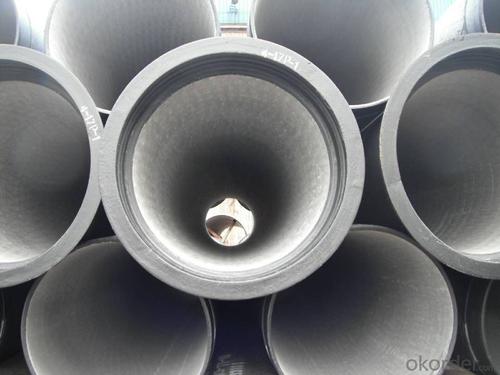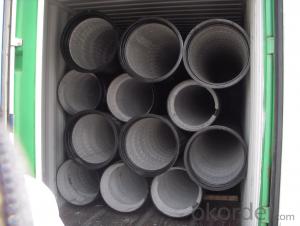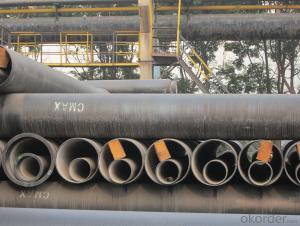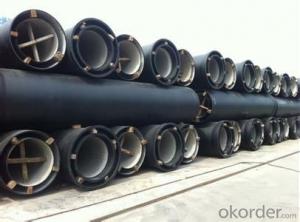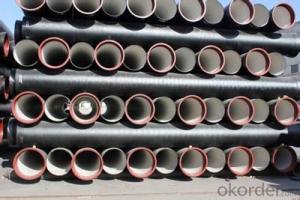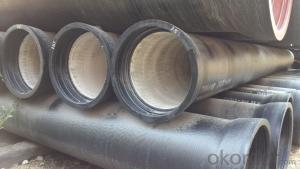DUCTILE IRON PIPE DN800
- Loading Port:
- China Main Port
- Payment Terms:
- TT OR LC
- Min Order Qty:
- -
- Supply Capability:
- -
OKorder Service Pledge
OKorder Financial Service
You Might Also Like
Specification:
1) The standard of pipe: ISO2531:1998, K9
2) Effective length: 6m
3) Inner cement line: Portland cement line as per ISO4179
4) Zinc coating: at least 130g/m2 as per ISO8179
5) Bitumen painting: at least 70um as per ISO8179
6) With 100% quantity of NBR ring, or SBR ring, or EPDM ring as per ISO4633
7) DN80mm-800mm
8) High strength, lighter than grey iron, good corrosion resistance, no furring, small flow resistance, easy fixing, long life tome about 100 yeas
9) Produced by Hangzhou chunfeng machine
10) Checked by automatic inspection equipment
11) Composition:
Chemical composition | |||
Chemical composition | Ductile Cast Iron Pipe (%) | Grey iron pipe (%) | Steel pipe (%) |
C | 3.5-4.0 | 3.2-3.8 | 0.1-0.2 |
Si | 1.9-2.6 | 1.4-2.2 | 0.15-0.4 |
Mn | 0.15-0.45 | 0.4-0.6 | 0.3-0.6 |
P | ≤0.06 | ≤0.3 | 0.02-0.03 |
S | ≤0.02 | ≤0.1 | 0.02-0.03 |
Mg | 0.03-0.06 |
|
|
12) Feature:
Mechanical properties | |||
| Ductile Cast Iron Pipe | Grey Iron Pipe | Steel Pipe |
Tensile Strength(Mpa) | ≥420 | 150-260 | ≥400 |
Yield Strength(Mpa) | ≥300 | No Confirmation | No Confirmation |
Bending Strength(Mpa) | ≥590 | 200-360 | ≥400 |
Elongation (%) | ≥10 | Neglected | ≥18 |
Brinell Hardness(HBS) | ≤230 | ≤230 | About 140 |
13) T type mechanical joint
14) Packing: in bulk or container
- Q: How are ductile iron pipes protected against internal corrosion?
- To safeguard ductile iron pipes from internal corrosion, a range of preventive measures are implemented. The foremost technique involves the application of a protective coating on the pipe's inner surface. This coating acts as a barrier that separates the pipe from the conveyed fluid, thereby minimizing the risk of direct contact and corrosion. Another commonly employed method is the usage of a cement mortar lining, which fortifies the protective barrier, thereby reducing the possibility of corrosion, even in aggressive environments. Moreover, this lining ensures a smoother surface, enhancing fluid flow by diminishing friction. Apart from coatings and linings, ductile iron pipes are often designed with corrosion-resistant alloys or additives. These alloys, such as zinc or epoxy, are incorporated during the manufacturing process, offering an additional layer of defense against internal corrosion. They function as sacrificial anodes, corroding over time to shield the underlying iron from degradation. Regular maintenance and inspection play a vital role in safeguarding ductile iron pipes against internal corrosion. Monitoring the condition of protective coatings, identifying any signs of degradation or damage, and promptly addressing such issues are imperative to ensure the long-term integrity of the pipes. In summary, a combination of protective coatings, cement mortar linings, corrosion-resistant alloys, and regular maintenance efforts collaboratively safeguard ductile iron pipes against internal corrosion. This approach prolongs their lifespan and guarantees the secure transportation of fluids.
- Q: How are ductile iron pipes protected against freeze-thaw cycles?
- Several measures are taken to protect ductile iron pipes from freeze-thaw cycles. Firstly, the material used in these pipes is naturally resistant to low temperatures, allowing them to withstand freezing conditions without becoming brittle or prone to cracking. Furthermore, a protective layer such as cement mortar lining or polyethylene encasement is often applied to the pipes. This extra barrier helps insulate the pipe and prevents direct contact between the iron and the surrounding environment, reducing the risk of freeze-thaw damage. Moreover, ductile iron pipes are designed with joints that allow for movement and flexibility. This design feature helps accommodate any expansion or contraction that may occur during freeze-thaw cycles, minimizing the risk of pipe breakage or damage caused by freezing water pressure. Proper installation practices, including sufficient bedding and backfilling, are also crucial in protecting ductile iron pipes from freeze-thaw cycles. Adequate support and suitable materials surrounding the pipes help minimize the impact of freezing temperatures on the structural integrity of the pipes. Regular inspection and maintenance of ductile iron pipes are essential for identifying any potential issues resulting from freeze-thaw cycles. Periodic assessments can detect signs of damage or deterioration, allowing for timely repairs or replacement to prevent further damage. In conclusion, ductile iron pipes are safeguarded against freeze-thaw cycles through the material's inherent resistance, protective coatings, flexible joints, proper installation practices, and regular maintenance. These measures collectively ensure the durability and longevity of ductile iron pipes, even in cold weather conditions.
- Q: How are ductile iron pipes different from PVC pipes?
- Ductile iron pipes and PVC pipes are utilized extensively in plumbing and water distribution systems, but they differ significantly in terms of their composition and properties. Ductile iron pipes are crafted from a particular form of cast iron that contains graphite nodules, which provide the material with ductility and flexibility. Consequently, these pipes can endure high pressures and heavy loads without succumbing to breakage or cracking. Ductile iron pipes are renowned for their robustness and longevity, making them particularly suitable for underground applications and areas with substantial traffic. Conversely, PVC pipes are constructed from a plastic known as polyvinyl chloride. These pipes possess rigidity and lack the same level of strength as ductile iron pipes. PVC pipes are commonly employed in low-pressure scenarios, such as residential plumbing systems, irrigation, and drainage systems. These pipes are lightweight, easy to install, and resistant to corrosion, rendering them a favored option for residential and non-industrial purposes. The cost disparity between ductile iron pipes and PVC pipes represents another distinction. Due to higher material and production expenses, ductile iron pipes tend to be pricier. Conversely, PVC pipes are relatively inexpensive to manufacture, making them a cost-effective choice for numerous plumbing projects. In summary, the primary disparities between ductile iron pipes and PVC pipes involve their composition, strength, flexibility, and cost. Ductile iron pipes, formed from cast iron, are celebrated for their strength and durability, while PVC pipes, formed from plastic, are lighter and more cost-effective. The selection between these two types of pipes depends on the specific demands of the plumbing project, including pressure, load-bearing capacity, and budgetary considerations.
- Q: How does ductile iron pipe perform in areas with high soil movement?
- Ductile iron pipe performs well in areas with high soil movement due to its inherent flexibility and strength. Its ability to withstand soil settlement, ground shifting, and seismic activity makes it a reliable choice for underground pipelines. The pipe's ductility allows it to sustain deformation without fracturing, ensuring continued functionality even in challenging soil conditions. Consequently, ductile iron pipe is an ideal solution for areas prone to soil movement, providing long-lasting and durable performance.
- Q: Are ductile iron pipes resistant to chemicals?
- Yes, ductile iron pipes are generally resistant to chemicals. Ductile iron is a type of cast iron that has been alloyed with small amounts of magnesium to improve its strength and ductility. This alloying process enhances its resistance to corrosion and chemical attack. Ductile iron pipes have been widely used in various applications including water supply, wastewater treatment, and industrial piping systems where they may come into contact with a variety of chemicals. However, it is important to note that the resistance of ductile iron pipes to chemicals can vary depending on the specific type and concentration of the chemical involved. Therefore, it is advisable to consult the manufacturer or a qualified engineer to determine if ductile iron pipes are suitable for a particular chemical application.
- Q: Are ductile iron pipes suitable for use in cooling water systems?
- Ductile iron pipes are indeed appropriate for utilization in cooling water systems. They exhibit remarkable strength and durability, rendering them impervious to the intense pressure and corrosive properties inherent in such systems. Furthermore, they possess the ability to withstand extreme fluctuations in temperature while delivering enduring performance. Additionally, ductile iron pipes exhibit commendable resistance to the proliferation of microorganisms, a crucial aspect in preserving the quality of the cooling water. Moreover, these pipes facilitate effortless installation and necessitate minimal maintenance, thereby constituting a cost-effective alternative for cooling water systems. In summary, ductile iron pipes represent a dependable and suitable choice for employment in cooling water systems.
- Q: Can the sealing ring of ductile iron pipe be reused?
- The sealing ring is hard to install and take off. I have been in this line for six years. I haven't seen it removed. The rubber ring itself is not expensive. It is not necessary to reuse it.
- Q: Can ductile iron pipes be used for underground chemical processing systems?
- Ductile iron pipes are generally not recommended for use in underground chemical processing systems due to their limited resistance to corrosion from various chemicals. While ductile iron pipes are known for their strength, durability, and flexibility, they are still vulnerable to corrosion when exposed to certain chemicals, especially those with high acidity or alkalinity. In underground chemical processing systems, there is a higher risk of exposure to corrosive substances that can deteriorate the ductile iron pipes over time. This can lead to leaks, cracks, and failures in the piping system, compromising its integrity and potentially causing hazardous conditions. For underground chemical processing systems, it is advisable to consider alternative materials that are more resistant to corrosion, such as stainless steel, PVC, or high-density polyethylene (HDPE) pipes. These materials offer superior chemical resistance and can withstand the harsh conditions typically present in chemical processing environments. It is crucial to consult with experts in chemical engineering, piping design, and corrosion resistance to determine the most suitable materials for underground chemical processing systems. Proper material selection is vital to ensure the longevity and safety of the piping infrastructure in such environments.
- Q: What if the ductile iron pipe is broken?
- Ductile iron pipe rupture can be repaired by using a cast iron defect repair machine, that is, a cast iron defect repair device. However, the general use of iron defects repair equipment can be repaired welding, and will not affect its use. Ductile iron pipes are used for water supply, so if it breaks, it will not be easy to handle. Make sure that the main valve is closed and repaired.
- Q: Can ductile iron pipes be used for wastewater reuse projects?
- Yes, ductile iron pipes can be used for wastewater reuse projects. Ductile iron pipes have several properties that make them suitable for such projects. Firstly, they have high strength and durability, which allows them to withstand the pressure and load requirements of wastewater systems. Additionally, ductile iron pipes have excellent corrosion resistance, which is important in wastewater applications where the presence of chemicals and corrosive substances is common. Furthermore, ductile iron pipes have a smooth internal lining, which reduces friction and improves the flow of wastewater. This is crucial for efficient transportation and distribution of wastewater in reuse projects. Moreover, ductile iron pipes are also known for their ease of installation and maintenance. They can be easily connected using various joint options, allowing for quick and efficient installation. Additionally, ductile iron pipes have a long service life, reducing the need for frequent replacements and minimizing maintenance costs. Overall, the properties of ductile iron pipes make them a suitable choice for wastewater reuse projects, providing strength, durability, corrosion resistance, smooth flow, and ease of installation and maintenance.
Send your message to us
DUCTILE IRON PIPE DN800
- Loading Port:
- China Main Port
- Payment Terms:
- TT OR LC
- Min Order Qty:
- -
- Supply Capability:
- -
OKorder Service Pledge
OKorder Financial Service
Similar products
Hot products
Hot Searches
Related keywords




